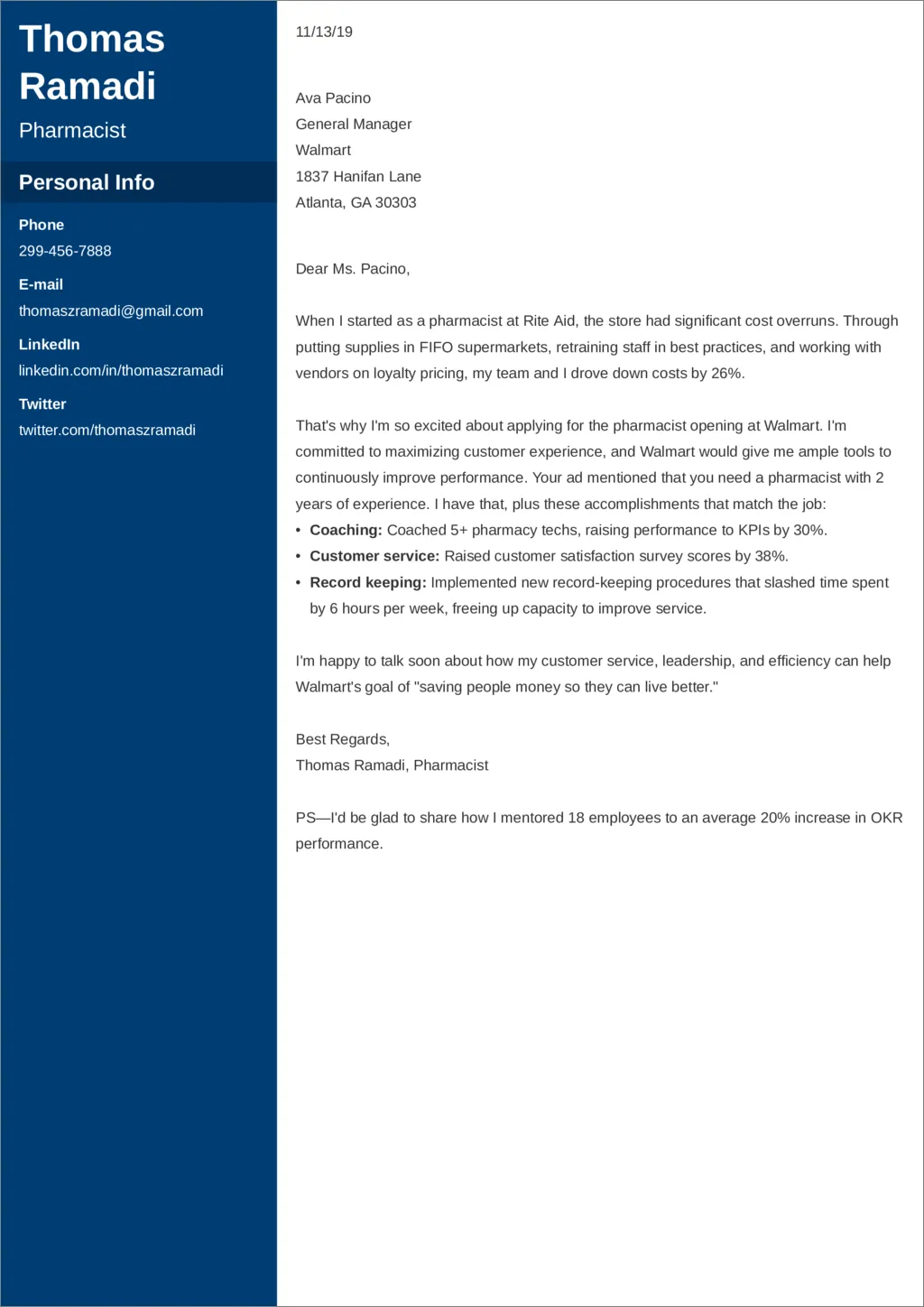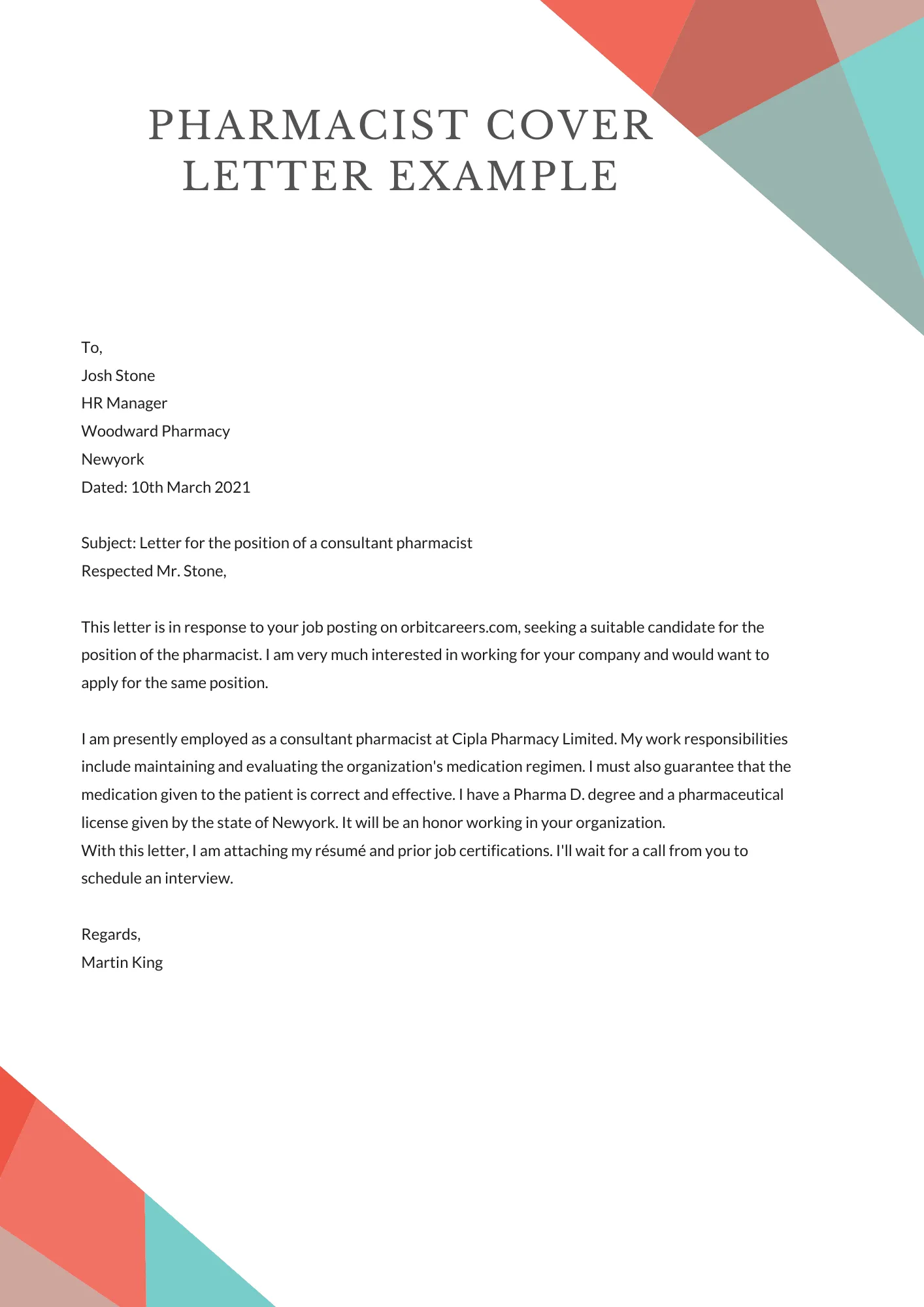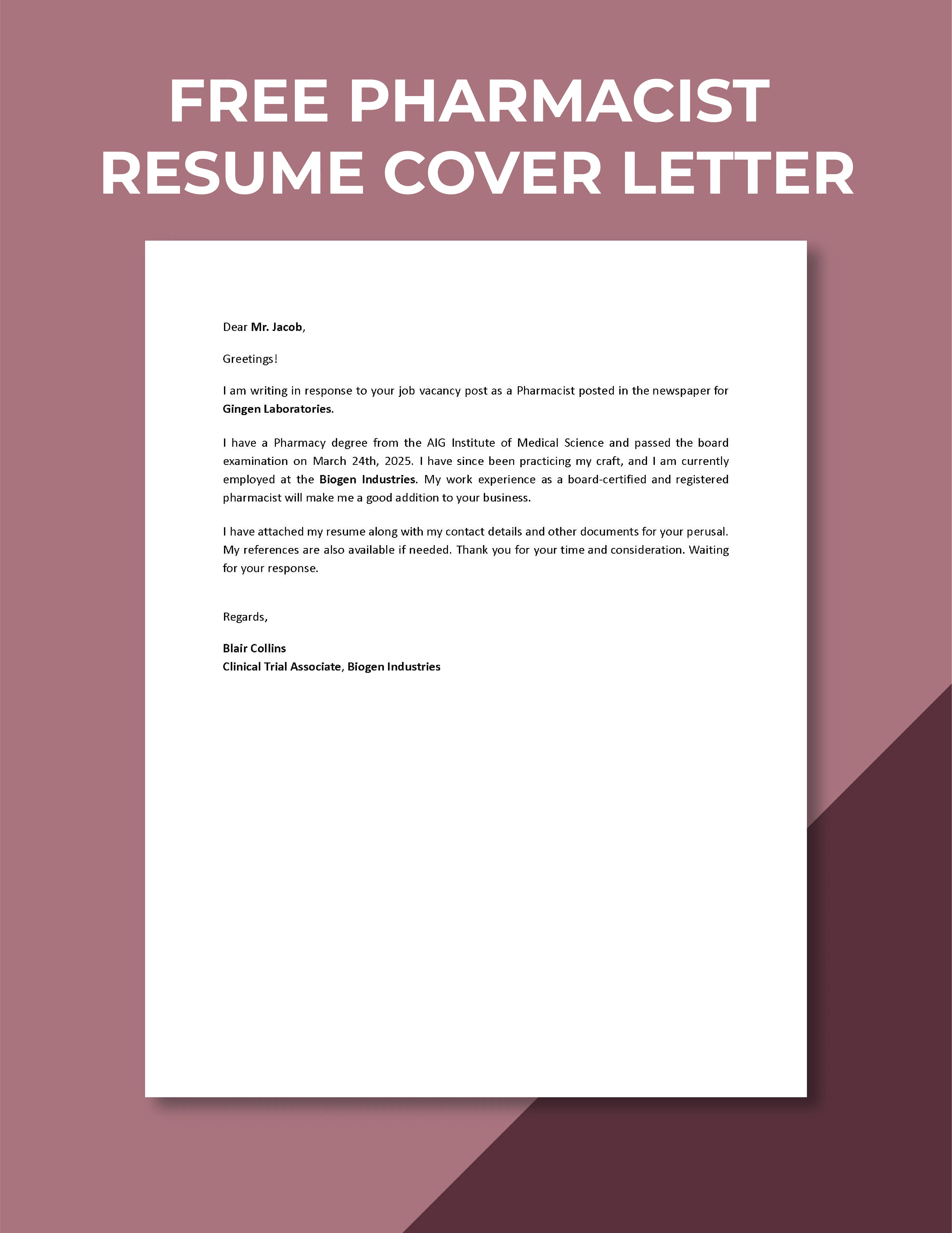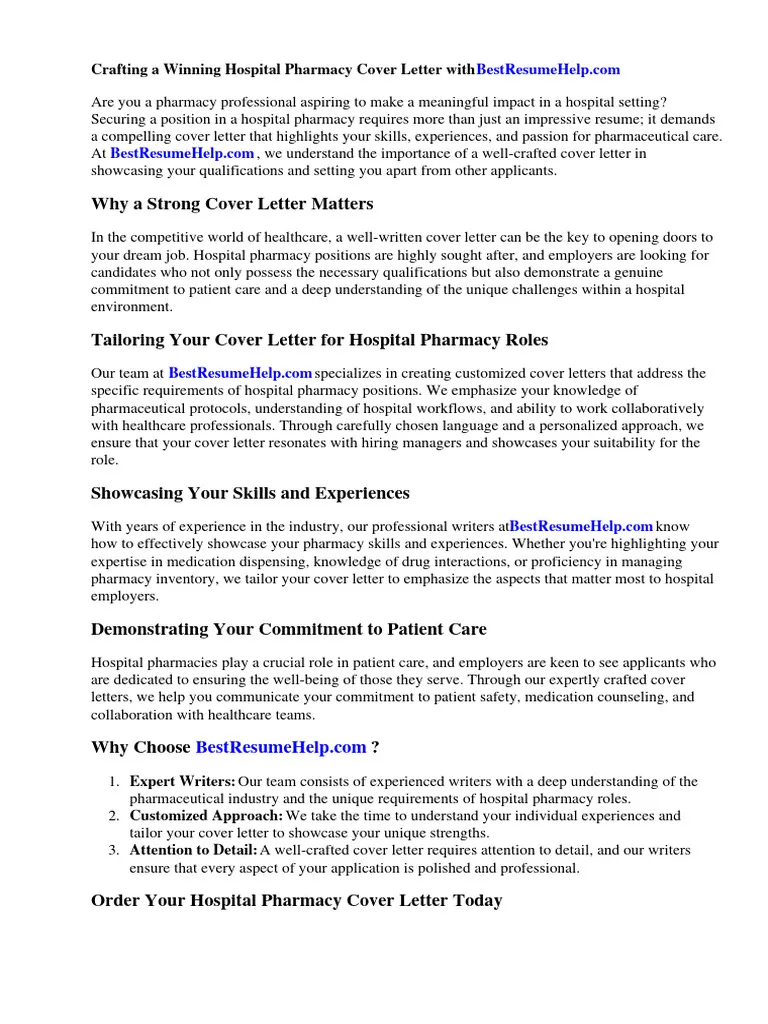Why a Pharmacy Cover Letter is Crucial
In the competitive field of pharmacy, a well-crafted cover letter is your first opportunity to make a positive impression on potential employers. It serves as a personal introduction, allowing you to go beyond the basic details of your resume and showcase your personality, passion for pharmacy, and suitability for the specific role. Think of it as your sales pitch, a way to highlight your unique skills and experiences, and to explain why you are the ideal candidate for the job. Unlike a resume, a cover letter gives you the space to tell a story, to connect your qualifications to the needs of the employer, and to demonstrate your genuine interest in the position and the company. A strong cover letter can significantly increase your chances of getting an interview, setting you apart from other applicants who may have similar qualifications on paper.
Highlighting Your Pharmacy Skills and Experience
Your cover letter is the perfect place to emphasize your relevant skills and experience in pharmacy. Start by identifying the key requirements outlined in the job description and then demonstrate how your skills and experience align with those requirements. For example, if the job description mentions the need for strong dispensing skills, you could highlight your experience in accurately and efficiently dispensing medications, managing inventory, and providing patient counseling. If the role requires experience with a specific pharmacy software or technology, be sure to mention your proficiency in these areas. Don’t just list your skills; provide specific examples that showcase your abilities. For instance, you could describe a situation where you resolved a medication error, provided exceptional patient care, or improved pharmacy workflow efficiency. Quantify your achievements whenever possible, using numbers to demonstrate the impact of your work, such as the number of prescriptions filled per day or the percentage of patients who reported satisfaction with your services.
Demonstrating Relevant Pharmacy Qualifications

While your resume provides a comprehensive overview of your qualifications, your cover letter allows you to elaborate on the most relevant ones. This is where you can showcase your educational background, certifications, and licenses. Mention your degree in pharmacy and any postgraduate qualifications, such as a PharmD or specialized certifications. If you have licenses to practice in the state or region where you are applying, make sure to clearly state this. Highlight any additional training or continuing education courses you have completed, especially those related to the specific job requirements or emerging trends in pharmacy practice. If you have experience in a particular area of pharmacy, such as compounding, clinical pharmacy, or medication therapy management, be sure to emphasize these qualifications and how they align with the employer’s needs. Remember to tailor your qualifications to the job description, focusing on the skills and knowledge that are most relevant to the position and the employer’s priorities.
Tailoring Your Pharmacy Cover Letter to the Job
A generic cover letter is unlikely to make a strong impression on employers. To stand out, you must tailor your cover letter to each specific job application. Carefully review the job description and identify the key requirements, skills, and qualifications the employer is seeking. Then, use your cover letter to demonstrate how your background and experience align with those needs. Address the employer’s specific needs and explain why you are the best fit for the position. Show that you understand the company’s mission, values, and culture. Research the employer and the pharmacy setting, and use your cover letter to highlight what attracts you to that specific opportunity. Personalize your letter by addressing the hiring manager by name (if possible), and use language that reflects your genuine interest in the role and the company. By tailoring your cover letter, you show the employer that you are not just sending out a mass application but that you have taken the time to understand the specific opportunity and how you can contribute to the pharmacy’s success.
Formatting Your Pharmacy Cover Letter Professionally
The appearance of your cover letter is just as important as its content. A professionally formatted cover letter demonstrates attention to detail and reflects well on your professionalism. Use a clean and easy-to-read font, such as Times New Roman, Arial, or Calibri, and maintain a consistent font size throughout the document (typically 11 or 12 points). Use standard margins (1 inch on all sides) and single-spacing. Divide your cover letter into clear, concise paragraphs and use headings to organize your thoughts and make the document easy to scan. Ensure your cover letter is free of grammatical errors, spelling mistakes, and typos. Proofread carefully before submitting. Include your contact information at the top of the letter, including your name, phone number, email address, and professional online profile (such as LinkedIn). Use a professional and appropriate email address. Consider using a formal business letter format, including the date, the hiring manager’s name and title (if known), the company’s address, and a formal closing (such as “Sincerely” or “Best regards”).
Key Elements to Include in Your Pharmacy Cover Letter

A strong pharmacy cover letter should include several key elements to effectively communicate your qualifications and interest. Begin with a compelling opening that grabs the reader’s attention and clearly states the position you are applying for. In the body of the letter, highlight your relevant skills and experience, providing specific examples to demonstrate your abilities. Emphasize your education, certifications, and licenses, focusing on those most relevant to the job requirements. Show your understanding of the employer’s needs and explain why you are the ideal candidate for the role. Express your enthusiasm for the opportunity and the company. Mention how your skills and experience can contribute to the pharmacy’s success. Always tailor your letter to the specific job requirements and the employer’s needs. Conclude your cover letter with a call to action, expressing your interest in an interview and providing your contact information again. Proofread and edit your cover letter carefully to ensure it is free of errors and reflects your professionalism.
Tips for Writing a Compelling Pharmacy Cover Letter
Writing a compelling cover letter requires careful planning, clear communication, and a focus on the employer’s needs. Before you start writing, carefully review the job description and research the company. Identify the key skills and qualifications the employer is seeking. Write a draft of your cover letter, organizing your thoughts logically and using clear and concise language. Use action verbs to describe your skills and accomplishments. Focus on your achievements and quantify your results whenever possible. Tailor your cover letter to each job application, emphasizing the skills and experience that are most relevant to the position. Show enthusiasm and genuine interest in the opportunity. Proofread and edit your cover letter carefully, paying attention to grammar, spelling, and punctuation. Ask a friend or colleague to review your cover letter for feedback. Keep your cover letter concise and to the point; ideally, it should be no more than one page long. Always include a call to action, expressing your interest in an interview and providing your contact information.
Showcasing Your Pharmacy Achievements and Results
To make your cover letter truly stand out, focus on showcasing your achievements and the results you have obtained in previous pharmacy roles. Instead of simply listing your responsibilities, provide specific examples of how you have made a positive impact. For instance, you could describe a time when you identified and resolved a medication error, reducing the risk to patients. Or, you could highlight how you implemented a new pharmacy workflow that improved efficiency and reduced dispensing times. Quantify your achievements whenever possible, using numbers to demonstrate the impact of your work. For example, you could mention the percentage increase in patient satisfaction scores after implementing a new patient counseling program or the number of prescriptions filled per day during your tenure. Use action verbs to describe your accomplishments and focus on the benefits you brought to your previous employers. By showcasing your achievements and results, you demonstrate your value to the employer and make a strong case for why you are the ideal candidate for the job.
Proofreading and Editing Your Pharmacy Cover Letter

Proofreading and editing your pharmacy cover letter is a critical step in ensuring it makes a positive impression. A cover letter riddled with errors can undermine your credibility and make you appear unprofessional. Before submitting your cover letter, carefully review it for grammatical errors, spelling mistakes, and typos. Pay attention to punctuation, capitalization, and sentence structure. Ensure your cover letter is clear, concise, and easy to read. Read your cover letter aloud to catch any awkward phrasing or sentence structures. Ask a friend, colleague, or career counselor to review your cover letter and provide feedback. They can often spot errors you may have missed and offer valuable suggestions for improvement. Consider using a grammar and spell-checking tool, but don’t rely on it entirely. Proofread your cover letter multiple times, as errors can often be missed during the first reading. By taking the time to proofread and edit your cover letter carefully, you demonstrate attention to detail and commitment to excellence.
Common Mistakes to Avoid in Your Pharmacy Cover Letter
Several common mistakes can detract from the effectiveness of your pharmacy cover letter. Avoid using generic or vague language that does not specifically address the job requirements. Do not simply repeat information from your resume. Instead, elaborate on your skills and experiences and provide specific examples. Avoid grammatical errors, spelling mistakes, and typos. Proofread your cover letter carefully before submitting it. Do not write a cover letter that is too long; aim for a one-page document. Avoid being overly formal or using jargon that the hiring manager may not understand. Do not include irrelevant information or personal details that are not related to the job. Avoid negative language or criticizing previous employers. Do not use clichés or overly enthusiastic language. Make sure your cover letter is tailored to the specific job application and that you have researched the employer and the pharmacy setting. By avoiding these common mistakes, you can significantly improve your chances of creating a compelling cover letter that impresses potential employers and helps you land an interview.
